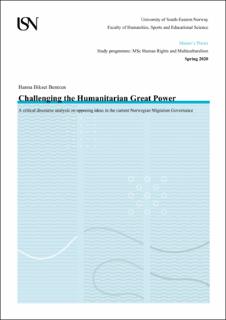Challenging the Humanitarian Great Power A critical discourse analysis on opposing ideas in the current Norwegian Migration Governance
Abstract
Academic scholars from different fields, but also international organisations, agencies and NGO’s have expressed concern for migration policies in Norway and how current European governance might endanger asylum rights and the principle of non-refoulement in the region (Casas-Cortes, Cobarrubias, & Pickles, 2015, p. 57; Linha et al., 2019; Mezzanotti, 2018). The aim of this study is to answer how Norway’s contrasting discourses on migration governance affect its status as a humanitarian great power while exploring how Norway’s foreign policy discourse on migration governance relate to the country’s current national policies on migration, and to what extent hegemonic power relations are being maintained and reproduced in this discourse, challenging human rights of migrants. The study is framed through the lenses of Norman Fairclough’s dialecticalrelational approach to CDA (2015) and Cox’s Critical theory of world order and hegemony (1981). A critical discourse analysis was applied to nine texts, comparing the discourse on national policies to foreign policy discourses on migration, generating a discussion related to the concepts of hegemony, ideology and power. Based on these concepts, the study displays how the power of discourse is defining and shaping the realities of migrants and might influence the status of a state. The study indicates that the Norwegian discourse on migration governance carries an ideological component related to the maintenance of power of the so-called ethnic-Norwegian. The current discourse highlights ideas that aim at keeping migrants at an arms distance, using fear as a means to increase power and affect migrants’ decision-making and rights. Awaiting a European solution (Søreide & Kallmyr, 2019, September 3), the national migration governance has its main focus on deterrence measures and stricter regulations for migrants residing in Norway. Thus, the study reveals a paradox to Norway’s status as a humanitarian great power.
